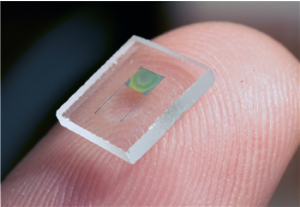
The high-performance 3D microbattery is suitable for large-scale on-chip integration.
Image: Engineering at Illinois
Engineers from the University of Illinois at Urbana-Champaign’s College of Engineering have developed a high-performance 3D microbattery applicable for large-scale on-chip integration with microelectronic devices.
“This 3D microbattery has exceptional performance and scalability, and we think it will be of importance for many applications,” said Paul Braun, professor of materials science and engineering at Illinois.
“Micro-scale devices typically utilize power supplied off-chip because of difficulties in miniaturizing energy storage technologies. A miniaturized high-energy and high-power on-chip battery would be highly desirable for applications including autonomous microscale actuators, distributed wireless sensors and transmitters, monitors, and portable and implantable medical devices.”
The engineers were able to develop the new microbattery by combining 3D holographic lithography and 2D photolithography.
This from University of Illinois at Urbana-Champaign College of Engineering:
Enabled by a 3D holographic patterning technique—where multiple optical beams interfere inside the photoresist creating a desirable 3D structure—the battery possesses well-defined, periodically structured porous electrodes, that facilitates the fast transports of electrons and ions inside the battery, offering supercapacitor-like power.
According to John Rogers, another engineer working with Braun and his team, the microbattery is designed so it is highly scalable and compatible with microfabrication.
“Micro-engineered battery architectures, combined with high energy material such as tin, offer exciting new battery features including high energy capacity and good cycle lives, which provide the ability to power practical devices,” stated William King, a professor of mechanical science and engineering.
Interested in Braun’s research? Check out his meeting abstract on li-ion battery electrodes published in the Digital Library!
If you’re interested in publishing with ECS, make sure to check out our technical interest areas and scopes.


